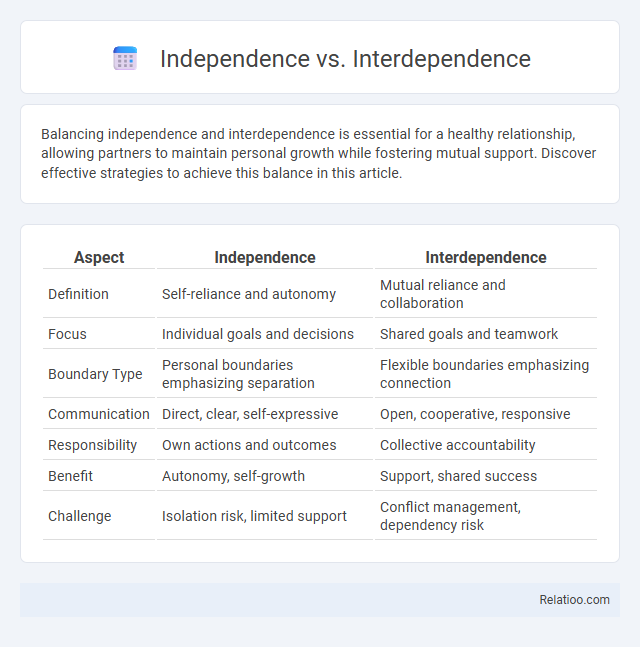Balancing independence and interdependence is essential for a healthy relationship, allowing partners to maintain personal growth while fostering mutual support. Discover effective strategies to achieve this balance in this article.
Table of Comparison
| Aspect | Independence | Interdependence |
|---|---|---|
| Definition | Self-reliance and autonomy | Mutual reliance and collaboration |
| Focus | Individual goals and decisions | Shared goals and teamwork |
| Boundary Type | Personal boundaries emphasizing separation | Flexible boundaries emphasizing connection |
| Communication | Direct, clear, self-expressive | Open, cooperative, responsive |
| Responsibility | Own actions and outcomes | Collective accountability |
| Benefit | Autonomy, self-growth | Support, shared success |
| Challenge | Isolation risk, limited support | Conflict management, dependency risk |
Defining Independence and Interdependence
Independence is defined as the state of self-reliance where an individual or entity operates autonomously without external assistance, emphasizing personal freedom and responsibility. Interdependence refers to mutual reliance among individuals, groups, or nations, where collaborative efforts and shared resources enhance collective outcomes. Understanding these concepts is essential for balancing individual autonomy with cooperative relationships in social, economic, and organizational contexts.
Historical Perspectives on Autonomy and Collaboration
Historical perspectives on autonomy highlight Independence as the foundation of individual and national self-determination, emphasizing sovereignty and self-governance. Interdependence has evolved through globalization, reflecting the necessity of cooperation among states and societies to address complex challenges such as trade, security, and environmental issues. The balance between Independence and Interdependence illustrates the dynamic tension between maintaining autonomy and fostering collaborative relationships essential for sustainable development and peace.
The Psychological Roots of Self-Reliance
The psychological roots of self-reliance are deeply connected to the balance between independence and interdependence, where personal autonomy coexists with social connectedness. Your self-reliance grows from developing emotional resilience, self-efficacy, and a secure sense of identity, allowing you to navigate challenges without losing the support of meaningful relationships. Emphasizing this balance helps foster psychological well-being by integrating individual strengths with collaborative engagement.
Cultural Variations in Independence and Interdependence
Cultural variations significantly influence how independence and interdependence are perceived, with Western cultures often emphasizing individual autonomy and self-reliance, while many Eastern and collectivist societies prioritize community, relational harmony, and interconnectedness. Your approach to decision-making and social roles may depend on these cultural norms, shaping whether independence is seen as personal freedom or interdependence as mutual support. Understanding these differences enhances cross-cultural communication and fosters respect for diverse values in global contexts.
Benefits of Embracing Independence
Embracing independence empowers you to develop self-reliance, boost confidence, and make decisions aligned with your personal values. Independence fosters innovation and allows for greater flexibility in pursuing your goals without reliance on others. This autonomy enhances problem-solving skills and nurtures a strong sense of responsibility, facilitating personal growth and resilience.
Strengths and Challenges of Interdependence
Interdependence fosters collaboration and resource sharing, enhancing innovation and problem-solving through diverse perspectives, but it can create challenges such as dependence on others' reliability and potential conflicts. Strengths include improved flexibility and resilience by leveraging collective strengths, while challenges involve managing coordination complexities and balancing individual autonomy with group goals. Successful interdependence requires strong communication, trust, and conflict resolution skills to maximize benefits and minimize risks.
Impact on Personal Relationships and Social Networks
Independence fosters self-reliance and personal autonomy, enhancing individual confidence but may limit emotional intimacy in relationships. Interdependence encourages mutual support and shared responsibility, strengthening social networks through collaboration and trust. Overemphasizing either independence or dependence can disrupt balance, affecting the quality and resilience of personal relationships and community bonds.
Independence vs Interdependence in the Workplace
Independence in the workplace emphasizes self-reliance, decision-making autonomy, and personal accountability, enabling employees to manage tasks efficiently without constant oversight. Interdependence fosters collaboration, shared responsibility, and collective problem-solving, which enhances innovation and team cohesion by leveraging diverse skills and perspectives. Balancing independence and interdependence optimizes productivity, as employees execute individual tasks confidently while contributing effectively to group objectives and organizational goals.
Finding Balance: Integrating Both Approaches
Finding balance between independence and interdependence involves cultivating self-reliance while embracing collaborative relationships to enhance personal growth and collective success. Integrating both approaches requires developing autonomy in decision-making alongside effective communication and teamwork skills. Achieving this balance fosters resilience, adaptability, and stronger social connections in both personal and professional environments.
Future Trends in Autonomy and Collective Action
Future trends in autonomy emphasize the rise of AI-driven systems capable of independent decision-making, enhancing individual operational efficiency. Interdependence is increasingly vital as networked technologies enable seamless collaboration among distributed agents, fostering collective intelligence and shared resource management. Balancing independence and interdependence will shape adaptive frameworks where autonomous entities coordinate to address complex global challenges.

Infographic: Independence vs Interdependence
 relatioo.com
relatioo.com